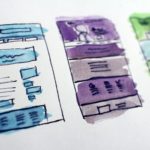There are a few benefits to running your own business; making your own decisions, building something you’re proud of, and controlling your time and calendar. Of course, though there can be the financial benefits; an opportunity to earn more, the potential to sell the business and greater tax efficiency.
The answer to the question is it depends. If you need the income then take it, if you don’t then you should carefully consider your options. I’ve included a great calculator at the end so read on.
How business owners pay themselves
To maximise tax efficiency, you will likely pay yourself a minimal salary each month through payroll. On top of the minimal salary, you probably move money from your business bank account to your personal bank account and post it against your director’s loan account.
If your business made a profit or has accumulated profits, you’ll either declare a final dividend at the end of your business year, or you’ll make an interim dividend during the business year. The dividend then clears your director’s loan account. Your business will pay corporation tax 9 months after your accounting period ends, and you’ll pay tax on the dividends in January after the tax year in which the dividend was distributed.
At the end of your business year, you have decisions to make. If you’ve had a good year and feel your business has the capacity to pay you more income, it can be very tempting to take it out. As you approach different thresholds you should be aware of what changes.
Approaching personal income £50,000, about £4,000 per month in your pocket
The personal allowance is a tax allowance available to most UK residents. It means the first £12,570 of your income is not taxed. Beyond the personal allowance dividends are taxed at 8.75% up to the basic rate band (£50,270). You are also afforded a £1,000 dividend allowance. Given the initial low tax rate this effectively works out to £4,000 per month in your pocket after tax. Anything above that and your dividend tax rate jumps to 33.75%. That’s a significant jump and will quickly push up your tax bill.
If you have children, you may also be affected by the High Income Child Benefit Charge. Exceed £50,000 in income and you may be liable for this tax charge.
Approaching personal income £100,000, about £6,700 per month in your pocket
The dividend tax rate of 33.75% is levied against much of your income. You do, however, benefit from a personal allowance which means the salary you pay yourself is effectively tax free. Go above £100,000 and you start to lose your personal allowance, so more of your income gets taxed.
Additionally, if you have young children and are benefiting from free childcare hours your family loses eligibility if either partner exceeds £100,000 in income. This could be costly, so you must think this through.
Approaching personal income £125,000, about £7,600 per month in your pocket
At this point your personal allowance is fully depleted, and you are looking at the additional rate tax band. Any income above £125,140 and your dividend tax rate becomes 39.35%. Thankfully, this rate doesn’t increase further.
Your options
If you are approaching any of these barriers, you should think carefully about how to proceed. Here are some options:
- You could leave the money in the business, this won’t reduce your corporation tax bill, but it means you could pay this cash out in a leaner year and avoid paying a higher rate of personal tax.
- Your business could make a corporate investment rather than leaving the money in cash. This doesn’t reduce your corporation tax bill, but the money is now working inside the business rather than paying a personal tax bill.
*Investments carry risk. Equity investments do not afford the same capital security as deposit accounts.
- You could make an employer’s pension contribution which will reduce your corporation tax bill, and you won’t have to pay personal tax. This helps you create financial freedom and save for the future.
*A pension is a long-term investment not normally accessible until 55 (57 from April 2028).
- If you own a car personally it might be worth exploring a company car instead. This can be really tax efficient if you choose one with minimal emissions. It could mean that you can reduce your personal expenses, allowing you to stay in a lower tax band.
- You can take the money out of the business, pay the personal tax bill, and make a personal investment. Yes, there’s tax to pay now, but you can make use of valuable tax allowances and invest in a tax efficient environment.
- Finally, if you need to spend the money or want to increase your lifestyle then post the dividend and pay the tax.
Summary
As a business owner you have choices. If you know how much income you need, and think through taking money from your business, then you are going to have a better outcome, and probably pay less tax.
If you want to play around with a fun calculator try the salary and dividend calculator I found here.
*Levels, bases of and reliefs from taxation may be subject to change and their value depends on the individual circumstances of the investor. It is recommended you seek the services of an accountant to structure your business taxes.
*The Financial Conduct Authority does not regulate tax planning.
Get in touch
We’d love to hear from you.
By contacting Wealth Spring you confirm you have read our privacy notice, which can be found here.


